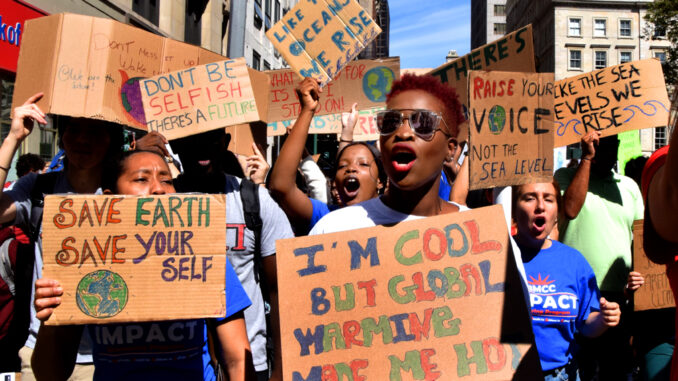
BY CAITLYN JONSSON
Across New York City, students are leading the fight for climate justice preceding the return of the Trump administration in January. As the climate crisis grows in urgency, student activists are critical of established political leaders’ competence for effective climate change mitigation.
Organizations like TREEage, Sunrise Movement, Fridays for Future, and New York City’s Climate Justice Hub are mobilizing students to take collective action for climate justice throughout the state, with some activists using the impending conservative administration to gain momentum and encourage others to join the movement. During Trump’s first term in office from 2017-2021, more than 125 environmental safeguards were rolled back.
Michael Menser, director of the Urban Sustainability program at Brooklyn College, predicted a resurgence in opposition to the fossil fuel industry under the incoming administration. Reflecting on historical trends, he noted how the first Trump presidency catalyzed the emergence of groups like Sunrise Movement, while momentum waned somewhat during President Biden’s time in office due to his mixed stance on energy policy.
“Biden was kind of pro-renewable and pro-fossil fuels at the same time, which was frustrating for folks,” Menser explained. As Trump appears “pro-fossil fuels and anti-renewables,” Menser anticipates a heightened wave of activism and antagonistic opposition to the fossil fuel sector as communities rally against policies that threaten climate progress.
“Gen Z and Gen Alpha are inheriting the earth, and that means we’re also inheriting the climate crisis,” said Leila Tazi, president of Brooklyn College’s chapter of TREEage. “Even though we didn’t personally cause it, we’re going to inherit the outcome of it,” Tazi added, highlighting the critical role of youth in combating the climate crisis. TREEage, a New York-based climate justice group led by high school and college students, empowers young activists through advocacy, grassroots campaigns, and community outreach.
“Explaining to young people that this is a huge issue impacting every living thing on this earth is very important,” Tazi said, noting efforts by some political leaders to suppress climate education and underscoring the urgency of educating young people about the realities of climate change.
Reflecting on the challenges posed by the political landscape, Tazi compared Trump’s return to the presidency to a natural disaster. “You brace yourself for the impact of it, you live through it, you survive it, then you have to just clean up and build back better afterward,” she explained, expressing hope for renewed progress after his term ends.
At a climate engagement event hosted by John Jay College on November 21st, activists from Sunrise Movement and Fridays for the Future urged undergraduates to mobilize. Michael Luca, an organizer with Sunrise Movement, emphasized the importance of collective action in times of climate crisis, which includes incorporating diverse perspectives in activism.
“Here in the United States I think climate change and justice tends to be represented by the White middle class who have the time for advocacy,” said Luca, arguing that “the ones who have the least responsibility for climate change are the ones who are impacted the most.” According to New York City’s Heat Vulnerability Index, Black people die of heat-related illness at a disproportionately high rate due to social and economic disparities stemming from structural racism, which includes neighborhood disinvestment, racist housing policies, lower pay, and less access to health care.
Sunrise Movement, a national youth-led climate organization, practices grassroots advocacy throughout the country. From lobbying for the Green New Deal to organizing protests against fossil fuel projects, the group empowers young people to demand systemic change.
Kenny Moll, a student activist and organizer with Sunrise Movement, said he felt disillusioned after the 2016 presidential election. He said that hope helped curb the climate anxiety he felt throughout Trump’s first term in office, and it is what continues to drive his activism. “I was radicalized. And I hate to use that term because I don’t think it is that radical to care about the environment,” Moll said. He added, “We as youth have historically been left out of this conversation, left out of the political process, but we have political power when we come together.”
Similarly, Fridays for Future, a global movement inspired by Greta Thunberg’s activism in Sweden, has mobilized students worldwide to demand urgent climate action. Through regular strikes and advocacy, the group strives to unite young activists. “We’re using every lever we have, testifying, passing legislation, working with elected officials,” said Michael Magazine, a member of Fridays for Future.
Though a Trump presidency poses threats to climate policy, some activists argue that Democratic leaders have shortcomings when it comes to the enforcement of renewable energy legislation. Asher Cohen, a 16-year-old climate activist based in Brooklyn, criticized New York State leaders for slow policy implementation, emphasizing the urgent need to hold them accountable. Cohen expressed frustration over Governor Kathy Hochul’s delay in signing the Climate Superfund Act, which aims to tax fossil fuel companies to fund climate adaptation projects.
“So much of the world is still wild and is still natural,” said Cohen. “When we are poisoning and destroying those natural places, it’s going to have ramifications everywhere,” he added, emphasizing the long-term risks of environmental degradation from mass fossil fuel consumption. “By the time we’re old enough to hold power ourselves, if we haven’t acted, we’ll be living in catastrophe,” Cohen said.
Professor Menser, who also serves as co-director of the New York City Climate Justice Hub, highlighted the innovative projects coming from young leaders in the program and said that “the ideas they come up with are amazing. They’re thinking big and making demands. That’s the energy we need right now.”
